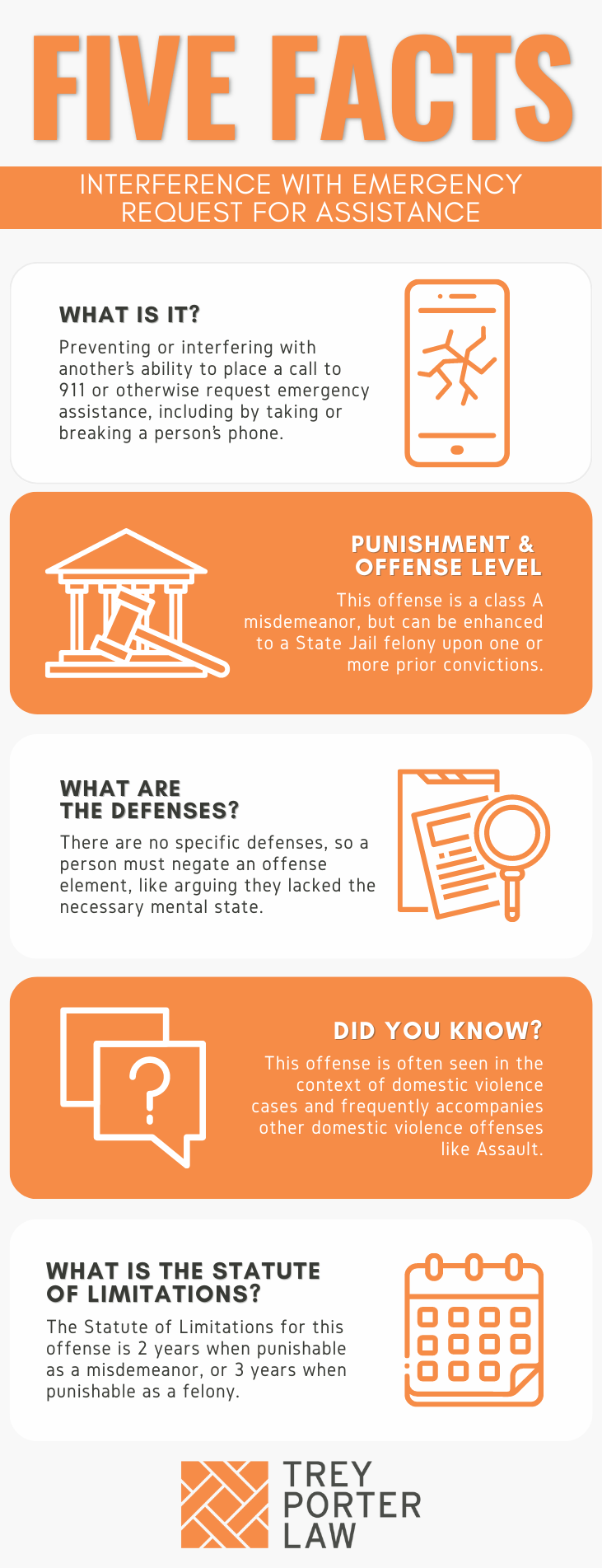WHAT IS INTERFERENCE WITH REQUEST FOR EMERGENCY ASSISTANCE IN TEXAS?
The Texas law against interference with a request for emergency assistance prohibits interfering with another’s ability to call 911, and recklessly breaking, taking, or otherwise rendering unusable another’s method to contact 9-1-1.
WHAT IS THE INTERFERENCE WITH REQUEST FOR EMERGENCY ASSISTANCE LAW IN TEXAS?
Tex. Penal Code § 42.062. INTERFERENCE WITH REQUEST FOR EMERGENCY ASSISTANCE.
(a) An individual commits an offense if the individual knowingly prevents or interferes with another individual’s ability to place an emergency call or to request assistance, including a request for assistance using an electronic communications device, in an emergency from a law enforcement agency, medical facility, or other agency or entity the primary purpose of which is to provide for the safety of individuals.
(b) An individual commits an offense if the individual recklessly renders unusable an electronic communications device, including a telephone, that would otherwise be used by another individual to place an emergency call or to request assistance in an emergency from a law enforcement agency, medical facility, or other agency or entity the primary purpose of which is to provide for the safety of individuals.
(c) An offense under this section is a Class A misdemeanor, except that the offense is a state jail felony if the actor has previously been convicted under this section.
WHAT IS THE PENALTY CLASS FOR INTERFERENCE WITH REQUEST FOR EMERGENCY ASSISTANCE IN TEXAS?
The first offense of interference with an emergency call is a Class A misdemeanor, punishable by up to one year in county jail. If a person charged with interfering with a request for emergency assistance has a prior conviction for the same offense, it is a state jail felony, punishable by 180 days to two years in a state jail facility.
WHAT IS THE PUNISHMENT RANGE FOR INTERFERENCE WITH REQUEST FOR EMERGENCY ASSISTANCE IN TEXAS?
The punishment range for interference with an emergency call charged as a Class A misdemeanor is a possible jail sentence of up to one year, and a maximum fine of $4,000. If charged as a state jail felony, the accused faces between 180 days and two years in a state jail facility, and a maximum $4,000 fine.
WHAT ARE THE PENALTIES FOR INTERFERENCE WITH REQUEST FOR EMERGENCY ASSISTANCE IN TEXAS?
A person charged with interfering with an emergency call may be eligible for probation after a conviction, or deferred adjudication without a conviction. The maximum period of community supervision for a Class A misdemeanor is two years. For a state jail felony, community supervision ranges between two and five years, with the possibility of extending supervision for up to ten years.
WHAT ARE THE DEFENSES TO INTERFERENCE WITH REQUEST FOR EMERGENCY ASSISTANCE IN TEXAS?
The statute does not authorize specific defenses to interference with a request for emergency assistance. A person accused thereof may attempt to negate at least one of the elements the State must prove at trial.
- What are examples of interference with a 911 call in Texas? Physical presence is not required to interfere with an emergency call. Aside from physically taking another’s phone, examples of interfering include cutting phone lines to prevent calling 9-1-1, installing secret call-blocking apps, and remotely disabling another’s phone during a 9-1-1 call.
WHAT IS THE STATUTE OF LIMITATIONS FOR INTERFERENCE WITH REQUEST FOR EMERGENCY ASSISTANCE IN TEXAS?
The limitation period for interfering with an emergency call classified as a Class A misdemeanor is two years. If the interference is a state jail felony, the limitation period is three years.
INTERFERENCE WITH REQUEST FOR EMERGENCY ASSISTANCE IN TEXAS
The law prevents interfering with another’s ability to call 9-1-1, or request emergency services through other means. This charge is typically brought in connection with a domestic violence dispute in which the assailant takes the victim’s phone to prevent the 9-1-1 call.
TEXAS INTERFERENCE WITH REQUEST FOR EMERGENCY ASSISTANCE COURT CASES
The case law regarding interference with request for emergency assistance in Texas gives examples of the types of conduct violating the statute.
- In Williams v. State, a 9-1-1 telecommunicator responsible for taking emergency calls was convicted of interference with emergency calls after her boss noticed her hanging up on several people attempting to report emergencies. One caller was reporting a robbery in progress, and had to call back twice after the defendant hung up on him. The appellate court affirmed her conviction—the defendant prevented, hindered, or impeded emergency calls by hanging up on callers, and no physical presence or contact with the victim or phone is required.













